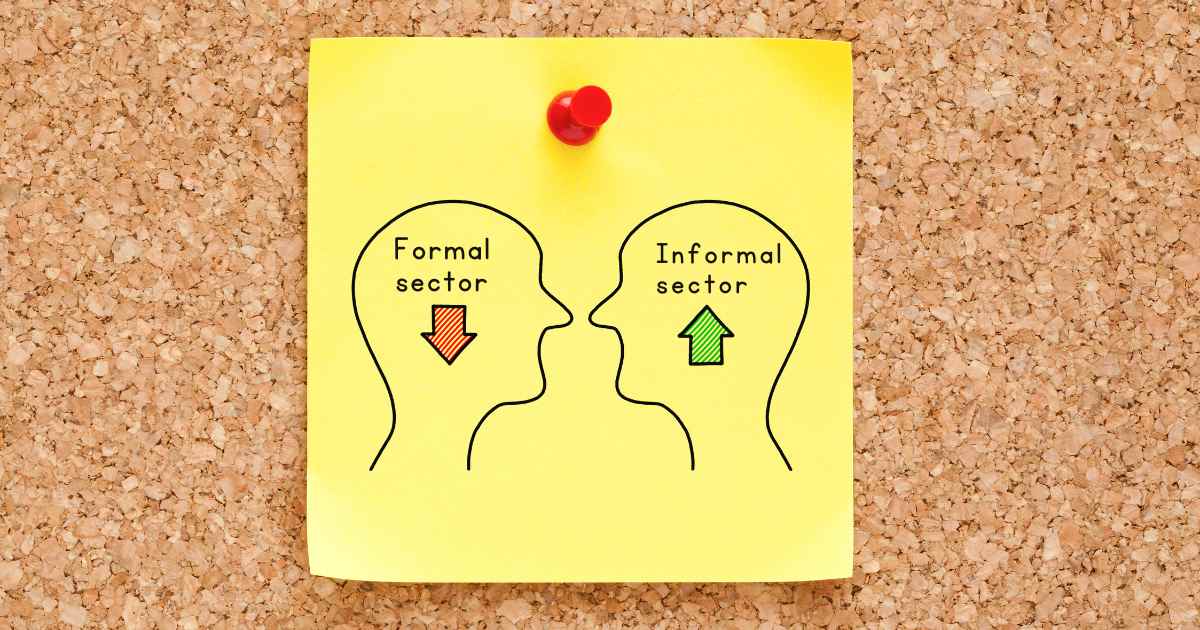
South Africa’s economy is made-up of more than just formal businesses, although this might be the most well-known side of business. On the other side, there is the informal sector. Businesses within both these sectors play a crucial role in the overall economic stability of South Africa. Although both these sectors have (almost) similar goals, there are differences between the formal and informal industry in South Africa.
As a business owner, it’s important to know the differences between the two so you can see where your business fits in. This will also help you recognise if they are any shortcomings within your business that you need to address.
In this article, we look at the differences between the formal and informal industry in South Africa.
What is the Formal Sector in South Africa?
The formal sector includes all formal businesses. These businesses pay their taxes, are regulated and have registered with the Companies and Intellectual Property Commission (CIPC). The formal sector includes widely known private businesses such as grocery stores, restaurants, banks and insurance companies to name a few.
The reason this part is called the formal sector is because the businesses within it, follow the necessary legal requirements and legally employ people. Basically, these businesses are ‘recognised’ as contributors to the economy.
What Is the Informal Sector in South Africa?
The informal sector plays an extremely important role in the economy. This part of the economy is not taxed by the government and typically features businesses which are not registered. The sector has an estimated 3,3 million micro- and informal businesses. In 2023, the informal sector employed over 7 million people.
Some examples of businesses within this sector include street vendors, domestic workers, spaza shops and businesses run from a person’s home.
Differences Between the Formal and Informal Sector
Formal Sector
Benefits: Employees and businesses within the formal sector enjoy a range of benefits.
Salary: The pay level in the formal sector is higher and usually follows the minimum wage set by the government.
Job Security: Formal businesses are registered and typically fall under certain legal requirements. This gives security to employees such as fixed working hours and time off.
Tax: Businesses in the formal sector are responsible for paying taxes to the government and also enjoy some tax benefits.
Trade Unions: Employees within the formal sector have a right to form or join a trade union. This is according to the Basic Conditions of Employment Act.
Informal Sector
Benefits: Typically, employees within the informal sector do not receive any benefits. This is usually because their employers are not registered.
Salary: In the informal sector, wages are usually lower than in the formal sector. This is because most of the businesses are informal and thus have less capital for higher wages.
Job security: In the informal sector, job security is not guaranteed. Additionally, things such as fixed working hours are not always available to employees in the sector.
Tax: Informal businesses are not liable to pay taxes to the government. Additionally, they do not receive tax benefits either.
Trade Unions: Employees within the informal sector do not have rights to forming or joining a trade union.
Note: A lot of small and micro businesses are considered to be informal due to their size. This does not mean they are not registered.
It’s clear that a majority of the businesses in the informal sector need just a little help to grow. This will take them from informal to formal and help contribute to the greater good of society and the economy.
The best way to grow these informal businesses is to offer them access to funding.
Funding for Informal Businesses in South Africa
As we know, informal businesses are sometimes just small or micro businesses which can grow into formal businesses. Some funding initiatives for these businesses are:
Khula Enterprise Finance
Under the Small Business Development Agency (Seda), Khula helps small businesses get loans from banks. Additionally, Khula provides mentorship to entrepreneurs to help them manage their businesses successfully.
South African Micro Finance Apex Fund (Samaf)
Samaf provides financial services to small-scale entrepreneurs. These entrepreneurs live in rural and outer urban areas.
Technology for Sustainable Livelihoods
This programme aims to create jobs for communities by helping to establish small businesses. The programme uses technologies which can add value to small businesses and makes them accessible to communities.
Umsobomvu Youth Fund
This programme helps youth set up, expand and develop their businesses. The fund also helps the youth by teaching them essential business skills.
National Youth Service Programme
This initiative aims to improve the employability of the youth by giving them work experience, skills development opportunities and learning opportunities.
Technology for Women in Business (TWIB)
This programme aims to make science and technology more accessible to women in business. It aims for women with small businesses.
These are just a few programmes which focus on small and micro (informal) businesses. If you are just starting out or already have a small business, one of these programmes could be the key to the growth and success of your enterprise.
Go to the advice page for actionable business mentorship.







